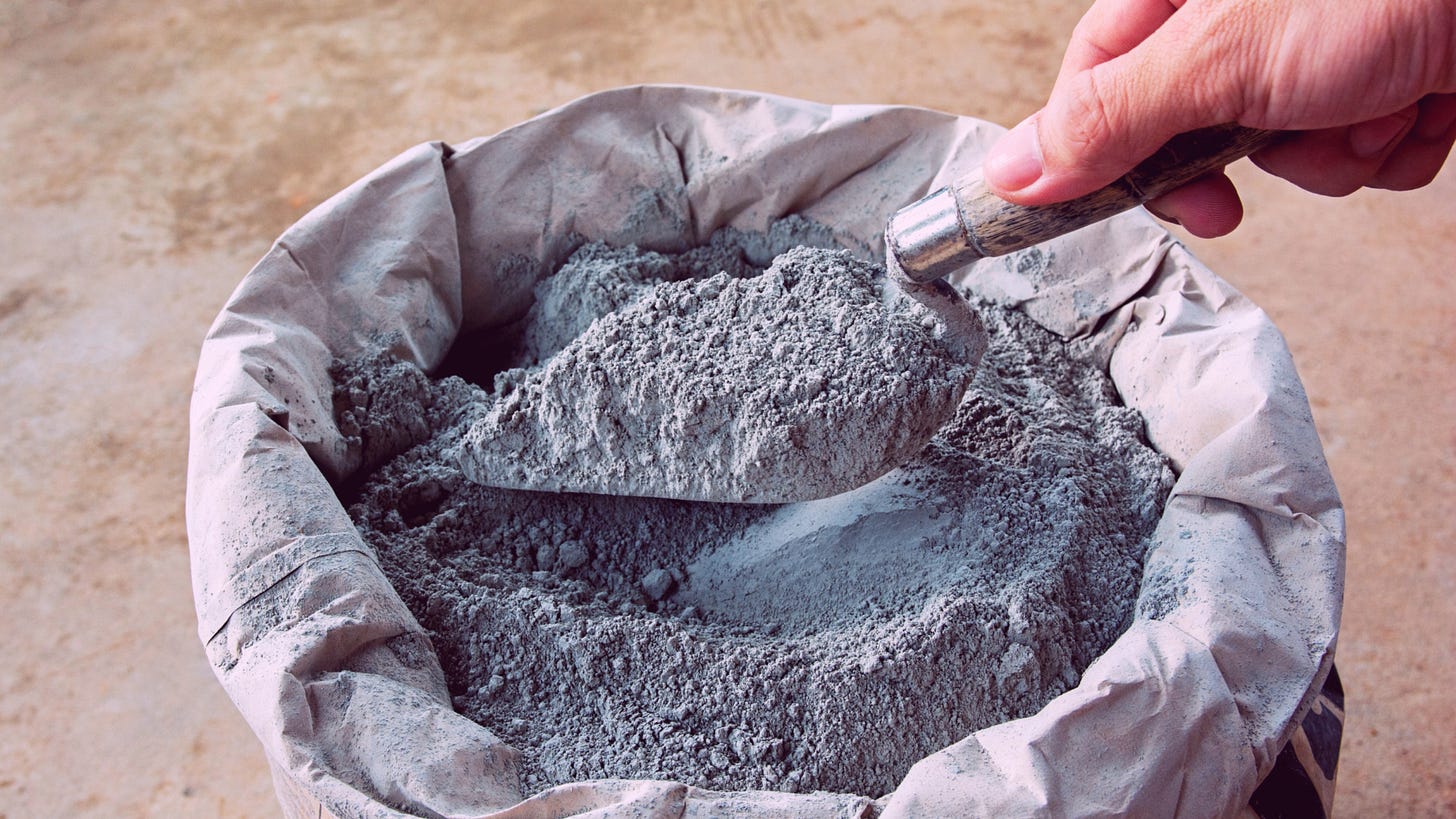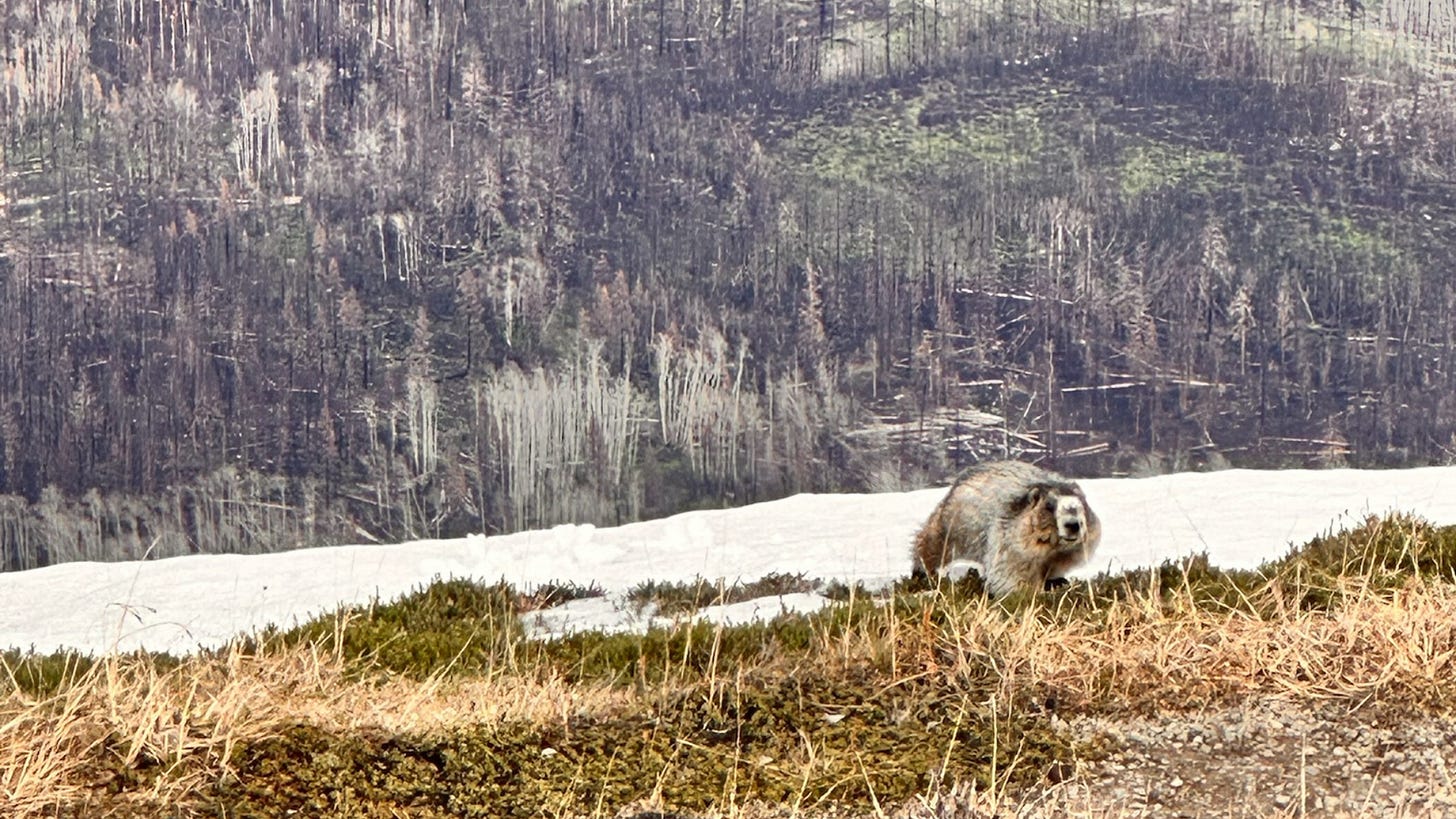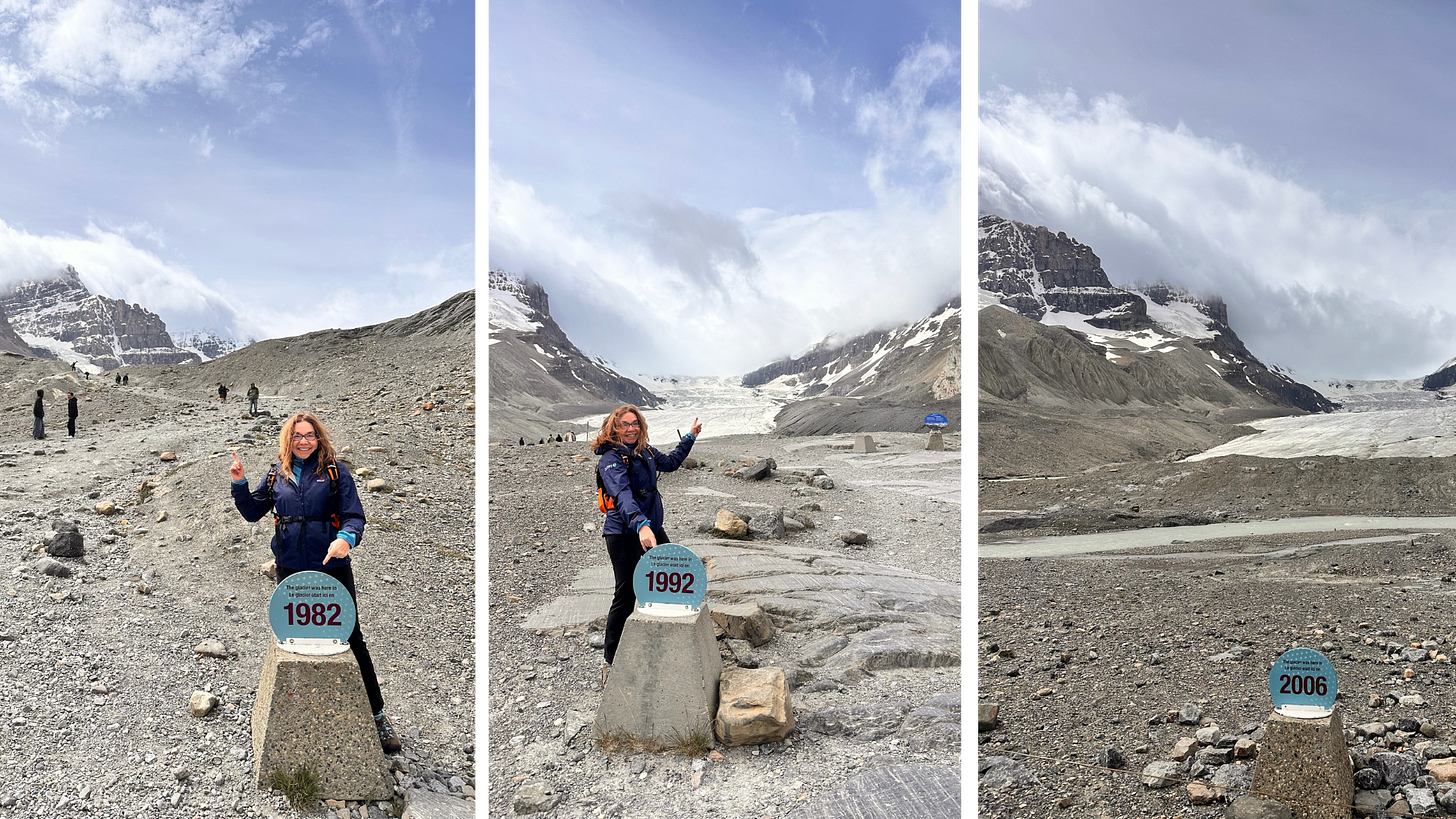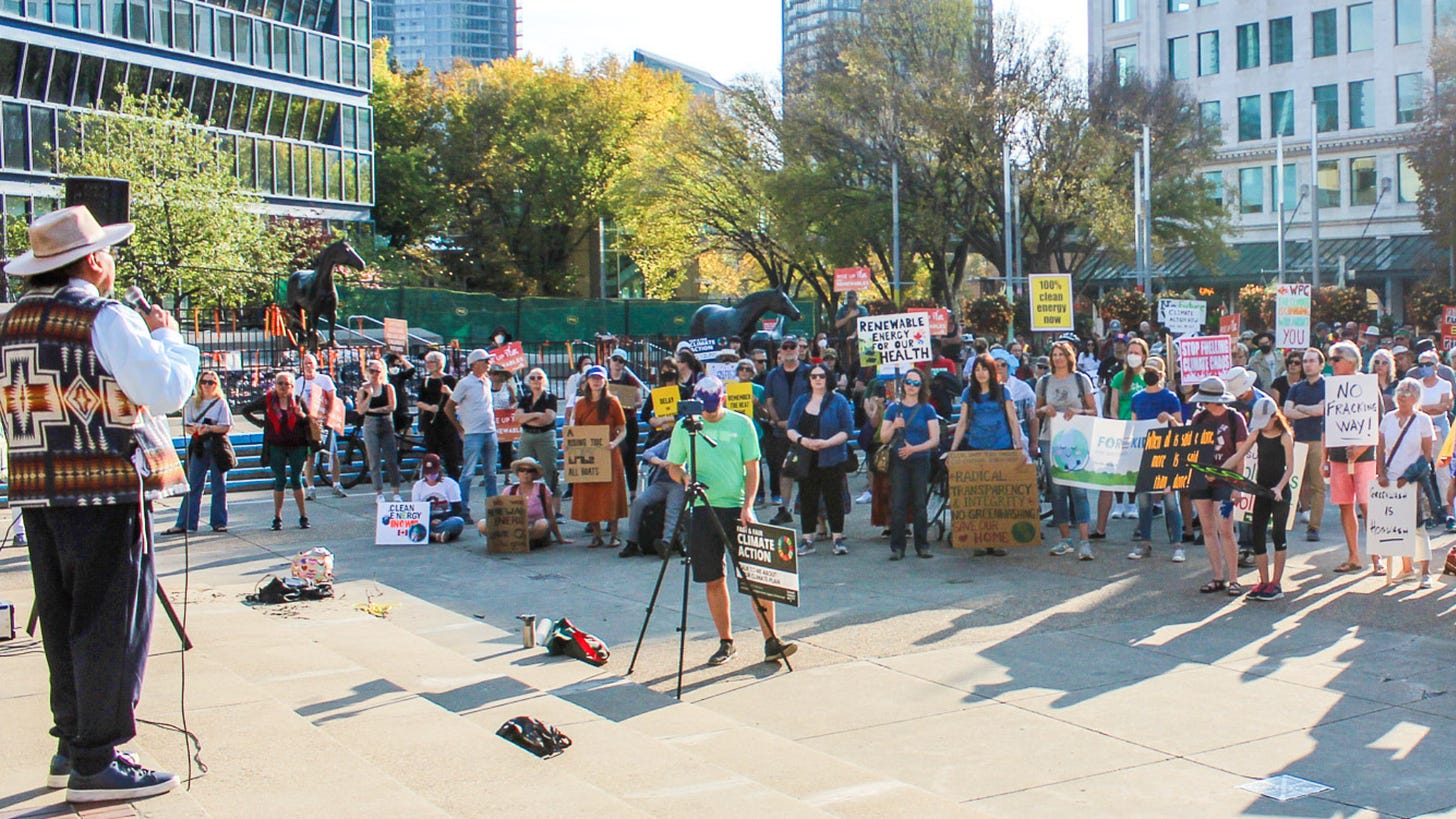What's heating up in Alberta
Innovation in Alberta, Canadian wildfire season, and why smaller countries matter when it comes to climate change
A few weeks ago, I was in Alberta — the Texas of Canada — for one of my bundled trips. (And it’s not just me who says that! The very same day I wrote this, an Alberta colleague emailed me and introduced himself using the exact same comparison.)
While there, I spoke at the international Rotary Convention and the University of Calgary, gave a public talk at the main city library with the Calgary Climate Hub, met with colleagues, and visited family.
Just as in Texas, there's a lot happening in this oil-rich province — some good, and some not so good. So that's what this newsletter is all about!
Alberta is home to Canada’s oil sands and is a hub of Canada’s oil and gas activity. But there are also a number of exciting climate solutions happening in the province.
Calgary is home to a company called Carbon Upcycling, which just won the prestigious Keeling Curve Prize for its novel climate solution: repurposing industrial waste to create low-carbon cement. The process takes steel slag - a byproduct of creating steel - and fly ash, which is left behind after burning coal, and uses them to sequester industrial CO2 emissions by producing cement.
Then there's the city of Calgary, which declared a Climate Emergency four years ago, pledging to achieve net‑zero greenhouse gas emissions by 2050. Their current Climate Implementation Plan aims to speed up emission reductions and resilience opportunities in areas ranging from buildings and transportation to waste and nature.
I love that they also offer climate equity programs, reminding everyone who visits their website that, “climate change affects everyone, but it doesn’t impact everyone the same way.” (almost exactly what I say nearly every time I give a climate talk!). Their Home Upgrades Program helps low income homes afford energy efficiency upgrades, while Climate Ready YYC grants help communities adapt to climate impacts.
I could give a dozen more examples of encouraging climate action in Alberta. Throughout my visit, I met so many people who are fully engaged in this fight, energized and committed to building a better future. As I often say in Texas, “if things can change here, they can change anywhere.” The same is true for Alberta!
Canada is warming twice as quickly as the rest of the world, and that temperature rise is leading to heatwaves, rising sea levels, flood events, and - yes - wildfires that are greater than we’ve experienced in the past. A World Weather Attribution study found that human-caused climate change made 2023’s record-breaking wildfire season in eastern Canada alone at least 7 times more likely, and doubled the risk of the most intense fires.
While I was in Alberta, I visited Jasper, a town that was decimated by a monster wildfire last July, forcing the evacuation of almost 25,000 people. A third of the buildings burned down, and the area remains surrounded by miles of burned forests.
The past three summers, smoke from wildfires has blanketed much of Canada and extended into the United States. "Smoke knows no political boundaries — and neither does fire," Lori Daniels, a forest ecologist at the University of British Columbia, told NPR in June.
Just this past week, smoke from wildfires burning in northern Ontario and the Prairies led the air quality in Toronto, where I am now, to be among the worst in the world. This map, updated in real time, shows you where wildfires are currently burning in Canada and the U.S. and where that smoke currently reaches.
Climate change is also causing glaciers across western Canada, including Alberta, to recede at record rates. In 2023, glaciers receded even during winter — a historic first. From 2019 to 2023, Peyto Glacier in Banff National Park (which you can see in the newsletter's cover image) receded 409 meters and shrunk 29 meters in height.
The Athabasca Glacier, where most tour buses on the Icefields Parkway stop, has markers showing where the glacier was not long ago: 1982, 1992, and 2006. By 2100, glaciers across western Canada are forecast to diminish by between 74 to 96 percent.
Ending this litany of bad news is the fact that the province of Alberta, which led Canada in new renewables in 2023, is now being led by a government that is taking steps to limit the growth of green energy in the province: exactly the wrong direction to be moving in.
Historically, the U.S. is responsible for nearly a third of all of the greenhouse gas emissions that are driving climate change. Annually, China is currently in first place, with the U.S. and India close behind. So when I’m talking about climate change in any other country, including Canada, I’m often asked: “We’re such a small country. Why does what we do matter?”
When it comes to Canada – and Australia, New Zealand, and many EU countries, as well – our per capita emissions are quite high. Canada has some of the highest in the world, and in terms of cumulative historical emissions our country ranks ninth globally. That’s nothing to sneeze at, sadly: and that’s why it’s so important to use our voices to support municipal, provincial, and federal climate action.
Canada has climate targets, but action is what matters. That’s where local groups like the Calgary Climate Hub who hosted my public talk in Calgary come in. They’re part of the Climate Reality Project of Canada, which is in turn part of a global network that trains people to have climate conversations wherever they live and work.
In addition to talking about how climate change puts our homes and health and future at risk, local groups often organize regular events. In the case of the Hub, this includes everything from tree plantings and climate conversations to nature walks and protests. As I often say (yet again), “we can’t fix climate change alone: but we can together.”
So this week, your action is to look for a local climate group in your city, province, state, school, or other organization. Sign up for their newsletters, share their content on social media, show up for one of their events, and invite someone else you know to join you! Often, a quick search will give you what you need; but if you want some more help, I’ve got a short list here to get you started. Don't be shy: if you need an excuse, just tell them: "Katharine made me do it!"










I’ve set up this organization in the UK. www.cleanupthetropicaltimbertrade.org. In 2023 we helped the indigenous communities of the Upper Baram rainforest in Sarawak defeat Samling Berhad, the biggest logging multinational operating in Malaysia, in court. All of which to say; we need to keep at it, all of us. You are my inspiration
First - I very much enjoy your newsletters, thank you for that.
In yesterday's newsletter, I was surprised to read about Carbon Upcycling using steel slags to create cement. The reason for this is a scandal here in The Netherlands about steel slags still being used in government approved building projects, despite the fact that research in the past determined that when they come into contact with water, they 'leak' poisonous heavy metals. The slaked lime inside the steel slags raises the pH of the water to levels comparable to sink unblockers. There was a recent item on a Dutch investigative journalism tv show Nieuwsuur ('news hour'), which you can watch here: https://www.youtube.com/watch?v=Vc61sQXh8GU (if the link gets stripped from my comments, you can find it by searching youtube for 'nieuwsuur staalslakken'). It is in Dutch, but the subtitles can be set to English. An English news article about this can be found here: https://www.dutchnews.nl/2025/07/dutch-ban-use-of-steel-slag-in-public-places-pending-research/
So my question is this: are they ignoring (or unaware of) this at Carbon Upcycling, or is their process a possible solution for the Dutch situation? Or is there another reason they don't have this problem, maybe their Steel slags are different?
I fear the first, of course, especially because lobbying by Tata Steel here in The Netherlands has led to the government, including our Department of Public (water)Works (Rijkswaterstaat) silently undoing a previous ban on the use of the material, probably because our steel industry is so important to the economy. The scandal this recently caused has led to calls for emergency legislation and the immediate suspension of the use of steel slags in areas where exposure is dangerous (like in kids playgrounds).
I am very interested in your take on this.